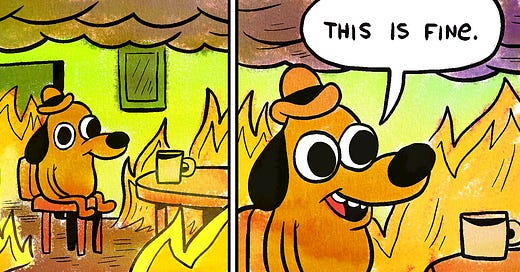Why good schools go bad
A short extract from my upcoming book 'Running the School- behaviour management for leaders' about how some schools turn a healthy behaviour culture into a toxic one.
Some leaders who have taken over a school where the culture is already calm and safe can squander that culture quickly. They think ‘oh we don’t need to be so tight on stuff, the kids here are fine.’ So they relax their systems, drop their expectations, relax a few rules, and tell staff, ‘I trust you, and want to empower you. Classroom management is now up to you.’
And they feel great about doing it. No more pedantic centralised systems. From now on, teachers can own the behaviour in their spaces! Coincidentally, this also means less work for leadership. But this noble intention, to devolve authority, also means that the teacher’s workload has expanded massively. You start to get enormous variations in practice between teachers, because some are more competent than others, some work harder, some are more relaxed, some have a lower threshold of tolerance, and so on.
Leadership follow-up on behaviour deteriorates, and incidents stop being recorded regularly. For a while this seems ok. If you visit in this phase it is possible to see a school with good behaviour but weak systems. But the storm is coming.
Six months later, things start to decay. But no one senior notices, so things get worse under the radar. They become impatient eventually with staff members who come to them with behaviour issues. ‘Can’t you deal with it?’ they say, and secretly- or not so secretly- blame the teacher for not ‘managing the situation.’
Eventually behaviour starts to degrade noticeably, so the leader decides that they need to do something, But, because they are oblivious what the right thing to do is, they do anything that feels good for them. That is usually restorative justice, trying to make lessons more fun, inspirational assemblies, lots more rewards for chaotic kids etc. It also, often involves shifting all responsibility for behaviour on to the teaching staff. And therefore, all the blame.
Things continue to deteriorate. The school usually at this point has some options: it doubles down, blames the teachers, hires more leaders, or they do nothing and just live with the chaos1. Schools can stay in that state for a long time, and whatever you think of a school inspectorate, without that mechanism, it can be a very long time indeed.
You also see similar error in schools that have had bad behaviour for a long time. For example:
Proust’s Boiled Frog2- things have been like this for so wrong people don’t; even notice things are wrong. ‘It’s not so bad,’ they say. ‘At least the kids are learning.’ But in the end, you can get used to anything, even the intolerable.
The Soft Bigotry of Low Expectation. ‘What can you expect from kids like these? They have terrible home lives. We’re just happy to see them come in.’ Which is fine up to a point, but after that point it isn’t. If we never expect better from children, then that is where most of them will stay.
Cognitive dissonance- things are terrible here/ and I am responsible for improving them/ but they haven’t improved/ that makes it looks like I am a failure/ I am not a failure/ I am a good person/ therefore this situation is too hard for anyone to fix/ I am a good person doing my best and this is ok
I secretly like it like this. Because things are chaotic, no one notices that I am struggling. I can turn up, do my best, and go home.
There is, of course, another category of school with weak systems and respectably good behaviour: the school with a cohort overwhelmingly composed of children from fortunate socio-economic circumstances. If you teach highly socialised children with high levels of self-restraint, positive self image, a strong sense of community and duty, and good gateway skills like literacy and numeracy, maybe throw in a healthy dose of positive regard for institutional authority and education, your experience of behaviour will be very different indeed from someone who teaches children who inhabit environments characterised by lack, neglect, poverty, abuse etc.
In such an environment, you will still experience misbehaviour, but the profile will heavily lean to the lower end of frequency and severity, compared to harder schools. And in such an environment it is perfectly possible to see leaders say, ‘Behaviour isn’t so hard- you mostly just have to ask them nicely and they’l do it.’ I’ve seen some of the most absurd platitudes about behaviour espoused in such environments, where, because behaviour has been good for so long, with little effort on the part of the school, it leads them to believe that little effort is required. This is like someone who lives in the Sahara desert wondering why people bother buying umbrellas. ‘Who needs an umbrella?’ they think. ‘It’s always dry!’
People who move from environments like that, to challenging ones, often pass out with the change in gear. People who go from challenging environments to low challenge ones wonder what to do with all the time. 3
Running the Room- behaviour for teachers, is available to buy now.
Running the School - behaviour for leaders, will be out soon…..
This is the point where I usually get a call from some of them. I do my best to help, and that is usually made much easier by the fact that they realise they need support.
Proust did not, as far as I know, have a boiled frog, or boil any frogs. I need to make that clear to his estate or heirs. But as God is my witness, I will mention this concept as often as breath allows me.
Happily, because this is teaching, that feeling never lasts long.




